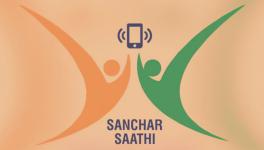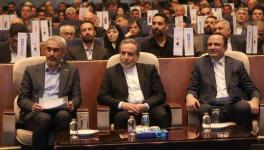Far-Right Enters Germany's Parliament for First Time in 60 Years
GREGORY WILPERT: Welcome to The Real News Network. I'm Gregory Wilpert joining you from Quito, Ecuador. Following Germany's Parliamentary elections on Sunday, it looks like Chancellor Angela Merkel is heading for a fourth consecutive term as Germany's head of state. Even though her party, the Christian Democratic Union, together with the Bavarian Sister Party lost almost nine percentage points, winning only 32.9% of the vote, the Christian Democrats are still the strongest parties in the Bundestag.
The real shock, although not completely unexpected, is that the far right party, Alternative for Germany, won 12.6% of the vote, meaning that for the first time in 60 years, a far right party will be represented in Germany's Parliament. Now the big question is which parties will Merkel form a coalition government with? There are six parties represented now, two more than in the previous period, which makes forming a coalition more challenging. Here's what Chancellor Angela Merkel had to say about her coalition options.
ANGELA MERKEL: [German 00:01:02]
GREGORY WILPERT: Joining me to analyze the results is Shir Hever. Shir is a Real News correspondent in Heidelberg, Germany. Welcome Shir.
SHIR HEVER: Thanks for having me Greg.
GREGORY WILPERT: So, let's start with the Alternative for Germany. What is it and how have they changed their agenda after Frauke Petry, the former leader of the party was isolated in the party? What is their agenda? What are they bringing to the Parliament?
SHIR HEVER: The Alternative for German is an extreme right party. It's relatively new and it started out resembling in many ways a kind of extreme right party, which you see in every European country, with an agenda against asylum seekers, against refugees, against immigration, for nationalism and a new liberal agenda as well on their economic platform.
Now, recently the party has made some changes, and like you say, they isolated Frauke Petry, the former leader, and brought in new members. It seems that the party is very highly influenced by another political party in German called the NPD, the national party of Germany. The NPD is actually not a new-liberal party because it combines both elements of socialism and nationalism and it has many members who are either openly or secretly neo-Nazis.
Now they realize that they're not going to get the minimum number of votes in order to get into the Parliament, so many of them have actually moved to the Alternative for Germany and started to change the party from within. So the Alternative for Germany continues to be a phenomenon that is not exactly parallel to right wing parties in other European countries. It's more extreme, but of course the agenda continues to be, to stop immigration, to stop accepting refugees and to have a very strong investment in military security and nationalism.
GREGORY WILPERT: But for a while earlier this year, it looked like the AFD was going to fizzle out. I guess it was mainly because of infighting and so on, while at the same time, earlier this year, the Social Democrats were surging under the leadership of Martin Schultz. What happened? Why did the AFD succeed unexpectedly and the SPD, the Social Democrats fail so miserably?
SHIR HEVER: Well I think that you have two explanations for this. On the one side, you can talk about the level of competence of the politicians themselves, but I think a much more interesting discussion is on the reasons and the conditions that lead to the rise of extreme right parties and to the fall of Social Democratic parties. The Alternative for Germany, despite its bickering and infighting within the party, does speak to a large group of Germans who are uncertain about globalization and uncertain about what should Germany's policy towards the Middle East and towards refugees be.
These people are responding with, I would say very emotionally, to the very sophisticated and very clever politics of Chancellor Angela Merkel. These politics are, when I say sophisticated and clever, that doesn't necessarily mean moral and humane, but certainly very economic-minded, in a way that uses the refugees to the benefit of the German economy. That message is sort of lost on a very large part of the German public, which has mainly seen that as threats, as barbarians at the gates and their response is to say Angela Merkel is destroying the country and we have to stop immigration at all costs.
Now, I think actually a lot of people expected the party to maybe lose some of its power because the flow of refugees has slowed down dramatically, because the situation in Syria is slowly stabilizing and the number of refugees coming to the border is decreasing. Also, because up to the election, the Merkel administration actually organized mass deportations of asylum seekers and refugees outside of Germany to show that actually she's already stopping immigration so there's nothing for the Alternative for Germany to fight about.
If you look at the regional elections and how quickly the Alternative for Germany is growing in those, it's not really a surprise. Talking about the Social Democratic Party, the SPD, well they made an attempt through the leadership of Martin Schultz to portray themselves as a young and vibrant party, ready to surge in power and become a real left alternative for the Merkel administration, but in practice and this is something that the Social Democratic Party always does, in practice they have no independent policy and they just try to copy the Christian Democratic Union.
In the debate between Martin Schultz and Angela Merkel, Martin Schultz adopted the language of Angela Merkel on the issues of the refugees and therefore he didn't seem to offer any kind of alternative. After the debate Martin Schultz called to do a redo of the debate. He asked maybe we can do another debate and discuss further issues. Merkel refused and that made him seem desperate and pathetic. I think towards the end, he was just not seen as a serious candidate that could replace her.
GREGORY WILPERT: Martin Schultz as the head of the SPD, the Social Democrats, said that his party, which was up until now part of the coalition, that he would not join a new coalition with the Christian Democrats, that he would join the opposition. Why did he say that? Why doesn't he want to stay in power?
SHIR HEVER: I admit that I'm a bit confused about this statement because the Social Democratic Party is a very senior position at the current coalition, which is now being dissolved. They hold very ministries, which they're going to lose if they go to opposition. My only kind of explanation to why Martin Schultz would say this is that he's being motivated by some kind of male chauvinist ego, that unless he can be number one, he doesn't want to play at all. Because he didn't get as much power as he expected in the election, did not get as many votes as he wanted, he sees that or interprets that as a message that the voters want him out of the coalition altogether.
I think maybe another explanation could be that Martin Schultz is concerned if the SPD is in the coalition with Angela Merkel, like the current coalition, that makes the Alternative for Germany, the far right party, the head of the opposition, the biggest party in the opposition. That gives them some kind of legitimacy and that is a threatening message as well.
GREGORY WILPERT: What are the possible coalitions now that could be formed in Germany?
SHIR HEVER: If you just look at the numbers, at the math, you see that the current coalition could actually continue to exist. It will just become much more narrow and less stable. Which means the SPD with the Christian Democrats, despite the statement by Martin Schultz, this is still possible. It's still in the cards, and Angela Merkel said it herself. But she would like to have a broader coalition of course because it makes her more powerful and gives her more negotiating power. No party can topple the coalition just be stepping out.
That's what she would rather have. She's now negotiating with two additional parties, the Greens and the FDP which are the new liberal extreme economic right party. One asks, one has to ask how can these two be together? The Greens want to have, their only point on the agenda actually is about climate. The party contains both left and right elements, so they don't have clear positions on issues like the arms trade or refugees and so on. Their focus is on climate
Even that contradicts the free market ideology of the FDP, which says no regulation, or minimum regulation. Let's lower taxes in order to increase industry, things which are hardly good for the environment. Nevertheless it might be possible for Angela Merkel to form this kind of coalition because the other alternative would be to bring in the far right Alternative for Germany. That party, all of the mainstream parties in Germany would be horrified at the prospect of having the Alternative for Germany inside the coalition. They want to keep them outside, in the opposition and everyone is hoping that maybe in the next coalition, they will fall under the minimum.
GREGORY WILPERT: The results of the previous coalition, when there were only four parties, created the possibility of a left coalition that would have included the left party, Die Linke, together with the Green Party and the Social Democratic Party. Instead the Christian Democratic party formed a coalition with the Social Democrats. Why do you think that the left coalition did not happen back then and do the left parties regret not forming a coalition four years ago? Is their decision related to the rise of the extreme right?
SHIR HEVER: I think four years ago, when that possibility became apparent as a result of the election, to have a coalition without the Christian Democrats, of the three more left parties, a lot of people in all of these three parties wanted that coalition to happen. If you look at the platform, if you look at the agenda, these three parties have a lot in common. The Left and the Social Democrats are also aggressive on climate issues like the Greens. Many of the members of the Green Party are also progressive on foreign policy, like the Left and the social issues between the Left and the Social Democrats are not that far away.
That's exactly the problem. That is exactly the reason why that coalition didn't happen. Because the left and the Social Democrats are afraid that the voters would not be able to tell them apart. The current head of the Left Party, Gregor Gysi, is taking his party as far to the right as he possibly can under the slogan of trying to make his party fit for government. He believes that if his party would resemble the Social Democrats enough, then he might get into the coalition.
In fact he's doing exactly the opposite because blurs the line between himself and the Social Democrats. He turns the Left Party into just a copy of the Social Democratic Party and that turns voters away because voters then go to the smaller parties which in the end don't actually manage to get the minimum. I think that's the reason that the coalition didn't happen then. Whether people regret it or not, that's a bit hard to say now, but I think this played into the hands of Chancellor Angela Merkel.
She completely understood that if she can outflank the Left and have her policy presented in the framework of a humane and ethical message that Germany will not turn away the refugees fleeing war and genocide in some cases and so on, then Germany would live up to its responsibility. Of course, not quoting on the front the fact that she had other reasons to engage with that policy, like economic interests. By flanking the Left parties, that really created the message that there is no alternative that all the parties are of one voice. That gives Angela Merkel a lot of power, but of course it means that people are looking for an alternative and that's why they vote for the Alternative for Germany. They're looking for a right wing alternative because they consider Angela Merkel to have gone over to the left. That would probably not have been possible if that coalition of the left parties would have been formed because then Angela Merkel would have been in the opposition and would have called support for right-wing policies.
GREGORY WILPERT: Right. That makes sense. Well, thanks Shir. We're going to continue keeping an eye on all of this. I'm speaking to Shir Hever, a Real News correspondent in Heidelberg, Germany. Thanks again Shir.
SHIR HEVER: Thank you, Greg.
Disclaimer: The views expressed here are the author's personal views, and do not necessarily represent the views of Newsclick.
Get the latest reports & analysis with people's perspective on Protests, movements & deep analytical videos, discussions of the current affairs in your Telegram app. Subscribe to NewsClick's Telegram channel & get Real-Time updates on stories, as they get published on our website.
























